Table of contents:
Key Takeaways:
- Make your message clearer: Dynamic, well-timed captions can enhance clarity during fast dialogue or quick transitions, holding viewer attention.
- SEO benefits: Captions with keyword-rich phrases can improve your video's search rankings on YouTube and Google.
- Use Riverside for best results: Riverside's AI-powered transcription tools automate caption creation andallow you to customize fonts, colors, and placement.
YouTube Shorts are trending big right now. These bite-sized, engaging videos are designed to rival TikTok and Instagram Reels. And if you want to make your Shorts really shine, captions are crucial.
We’ll walk you through adding captions to your YouTube Shorts and explain exactly why they matter. We’ve also included a troubleshooting guide to ensure everything goes smoothly.
Why should you add captions to YouTube Shorts?
Wondering why captions are worth the effort? Here's why adding open or closed captions matter for your Shorts:
Enhance content accessibility
Captions deliver your key points without sound and make your Shorts more inclusive. This allows viewers with hearing issues to enjoy your content.
You can use YouTube’s auto-caption feature as a baseline, but always double-check and refine your captions for clarity and timing. For faster editing, apps like Riverside let you edit captions while previewing the video in real time.
Reach a “sound-off” audience
Did you know that 75% of mobile users watch videos on mute? Captions are your lifeline to keeping these viewers engaged in soundless settings, like a quiet office or a busy train ride.
Keeping this in mind, you can add emotional cues to your captions. A well-placed “[laughs]” or “[dramatic pause]” can recreate the full experience, even without audio. You should also keep captions short and aligned with your video’s pace.
Boost viewer retention
With Shorts, every second counts. Fast dialogue or quick transitions can confuse viewers, which won't make them stick around. Captions ensure your audience stays with you until the end. A good tip is to use dynamic captions that pop up as the words are spoken. It adds energy and keeps viewers engaged. Adjust the pace of your captions and use eye-catching and dynamic fonts and colors to make them pop.
Diversify your audience with SEO
Captions also boost your organic discoverability. YouTube indexes captions, so adding keyword-rich phrases increases your chances of appearing in search results on YouTube and Google.
Before creating a Short, research trending keywords in your niche. Subtly integrate these keywords into your script so that they appear in captions and align with what your target audience is searching for.
Cater to mobile viewers
Most Shorts are watched vertically on small screens, often in less-than-ideal conditions (think crowded cafes or midnight scrolling). Captions help ensure your content's message is crystal clear. However, to ensure they work well for mobile viewers, you need to place them in the lower third of the screen, away from YouTube’s “Like,” “Comment,” and “Subscribe” buttons. For each caption, use 1-2 lines with a font size that’s easy to read; 16-22 px for mobile.
Strengthen visual messaging
Captions aren’t just text—they’re a visual tool. Highlighting specific words or phrases with color or animation can emphasize emotions, punchlines, or key takeaways.
Imagine a bold caption landing perfectly with a punchline for added comedic impact or key terms standing out in an educational Short. Nice, right?
Improve content professionalism and quality
Well-done captions signal effort and quality, helping your videos rise above the sea of low-quality uploads. A polished look boosts your credibility and keeps viewers coming back for more. Moreover, you can match your captions to your channel’s visual aesthetic, creating a seamless vibe that makes your videos instantly recognizable.
Work with YouTube’s algorithm
Captions serve as metadata, making your Shorts more searchable and recommendable to your target audience. You can also add translated captions to reach entirely new audiences.
Use YouTube’s Subtitle Editor to translate captions into your top-performing regions’ languages (you can find this data in YouTube Analytics).
How to add captions to YouTube Shorts with Riverside
Add captions to your YouTube Shorts effortlessly with Riverside. Its AI-powered transcription tool handles the heavy lifting, automatically generating and syncing captions. You can skip the manual editing and focus on creating content that hooks your audience.
Riverside also lets you customize fonts, colors, and branding elements to stay on-brand. Plus, It makes it easy to optimize everything for YouTube Shorts with a click (think: 9:16 aspect ratio and precise caption placement), so you don’t have to mess around with extra tools.
Riverside also allows you to choose between open and closed captions.
Here's how to add captions to a video for your YouTube Shorts using Riverside:
Step 1: Record or upload your video
Did we mention that Riverside record's video in dazzling HD video and audio? Well, it does. Riverside also automatically provides AI-generated transcriptions for your recordings, so the transcription is immediately available in the video editor after you’ve recorded or uploaded your video.
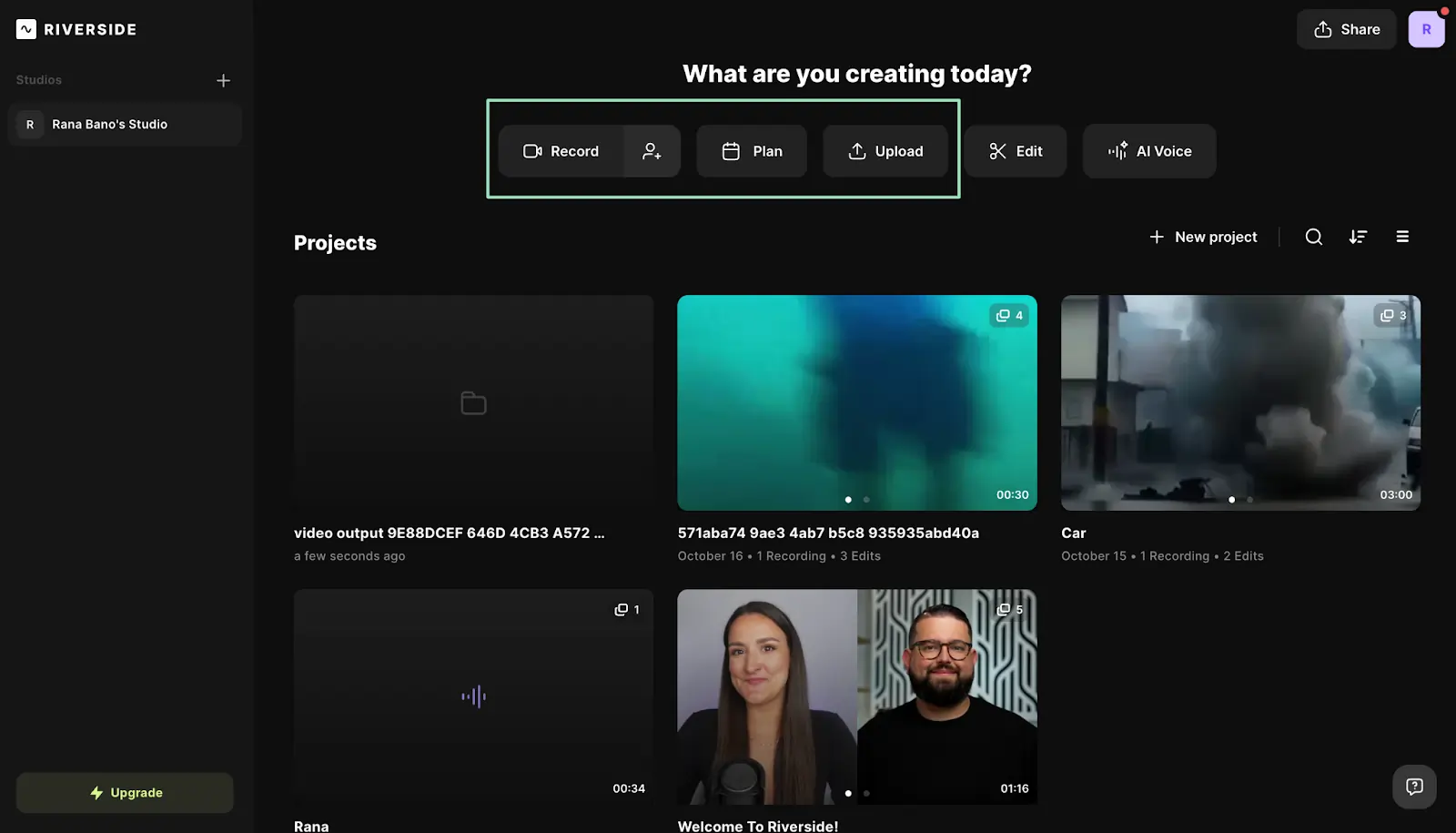
Step 2: Edit and adjust your captions
Promptly review your transcript to correct any errors, especially those arising from background noise or unique terminology. All edits are automatically synchronized with the corresponding video segments. And don't worry; the editor maintains perfect alignment. Riverside offers text-based editing, meaning that you can edit the transcript like a regular text document to edit your video's contents.
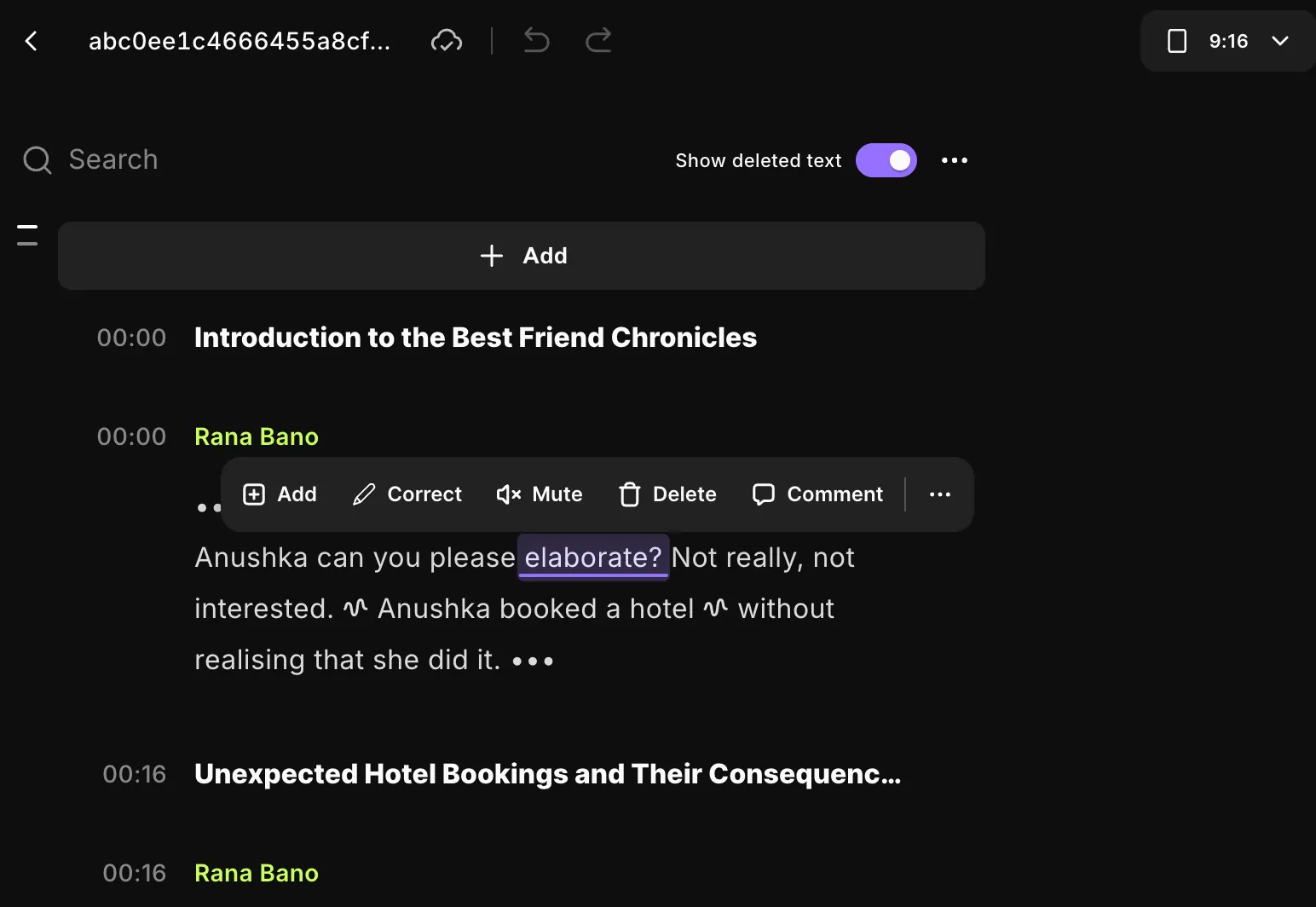
At this stage, you can also remove filler words and adjust timestamps. We also recommend using Riverside's audio enhancer to remove background noise and improve the overall quality of your audio.
Step 3: Customize captions
Select “Captions” from the menu on the right side of your editions. Then, choose from various fonts, sizes, and colors to match your brand aesthetics. You can even animate the font!
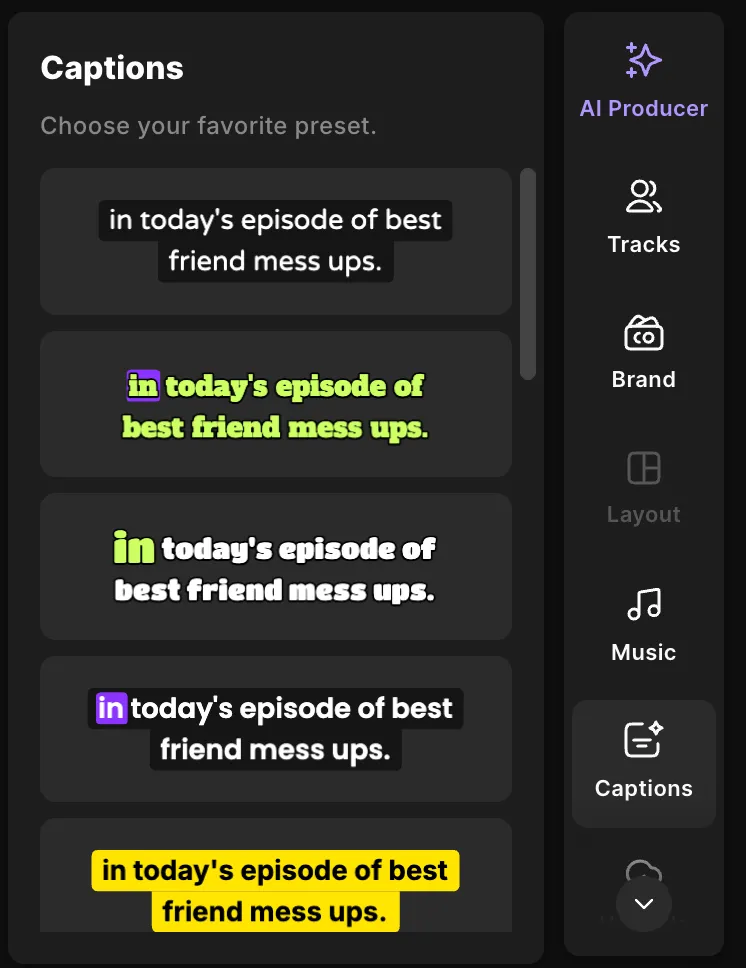
Step 4: Adjust your video’s aspect ratio
Next, set your video to the 9:16 aspect ratio required for YouTube Shorts. Position captions to avoid overlapping with essential visuals, such as a subject’s face or on-screen graphics.
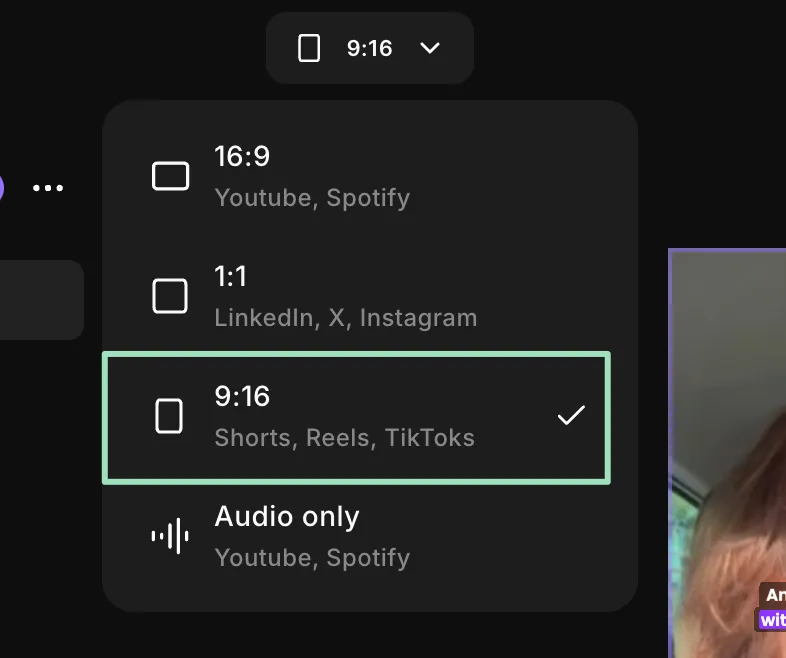
Preview your video in the Shorts format to ensure that the visuals and captions appear polished and professional.
Step 5: Export your video and captions
After editing, click “Export” to save your video and captions. If you’ve created closed captions, click “Go to Exports” and “Recording Files” to download your captions as an SRT file.
.webp)
How to add captions to YouTube Shorts automatically on YouTube
You can automatically add captions to your videos using YouTube’s built-in voice recognition tools. Note that transcription and caption quality can vary, but the tool works well and is easy to use. Follow these simple steps to add captions and subtitles to YouTube videos.
Step 1: Sign in to YouTube Studio
While it’s possible to do this from a mobile device, logging in from a desktop is usually best, as you have better access to the controls you need.
Step 2: Select your video
Head over to “Content” and click on the selected video from the list that appears. You can add captions to public, private, and unlisted videos.
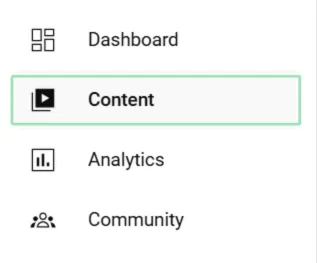
Step 3: Add Captions
Select the “Subtitles” icon on the menu on the left side of your screen.
.
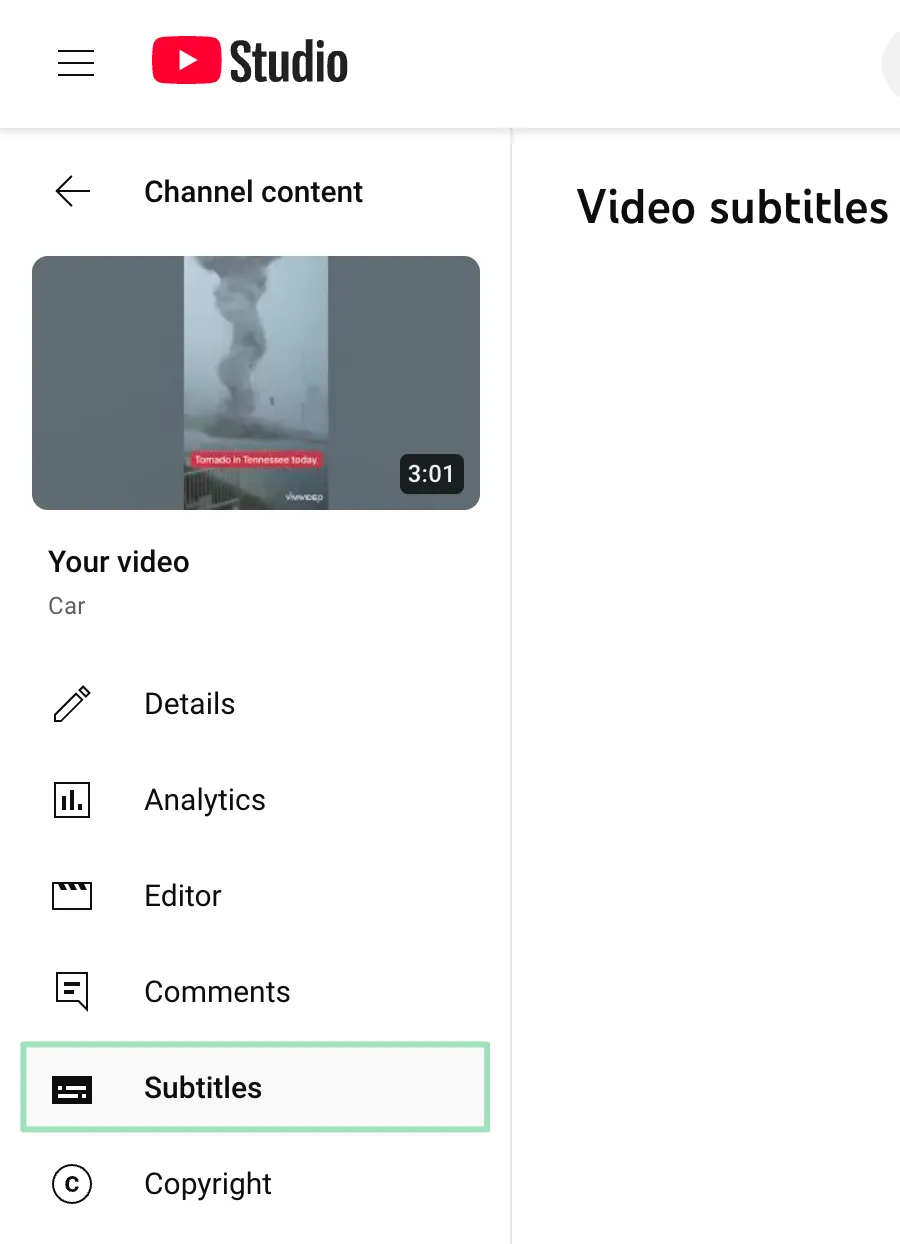
If your video is new, it’ll take a minute or two for YouTube to transcribe and caption your content. If your video is already live, it’s likely YouTube will automatically apply subtitles to your published video content.
💡Note: If you have never added automatic subtitles on YouTube, you will be asked to confirm your language settings.
Step 4: Review and edit your subtitles
To review and edit your subtitles, hover over the published captions field and select the “pencil” icon.
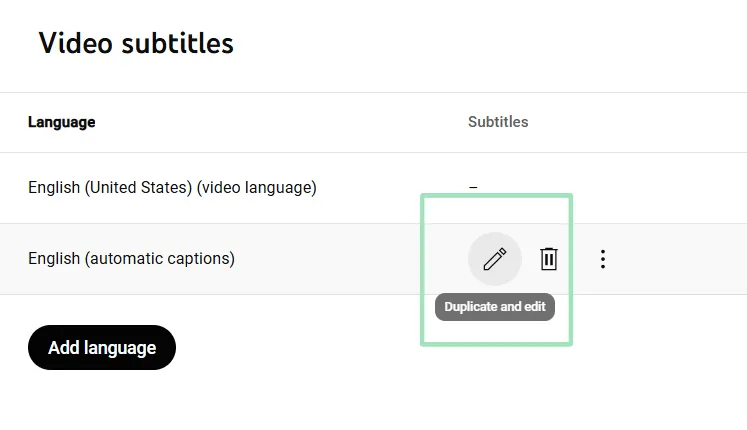
A window with a copy of YouTube’s subtitles will appear. Here, you can use the text boxes to edit the text that appears. You can choose to:
- Edit as Text: This will show you a plain text transcript
- Edit Timings: This is a time-stamped version of your subtitles. You can also click and drag along the subtitle timeline to alter the timing.
Simply edit your text, correct typos, and select the “+Caption” button to add a new caption line.
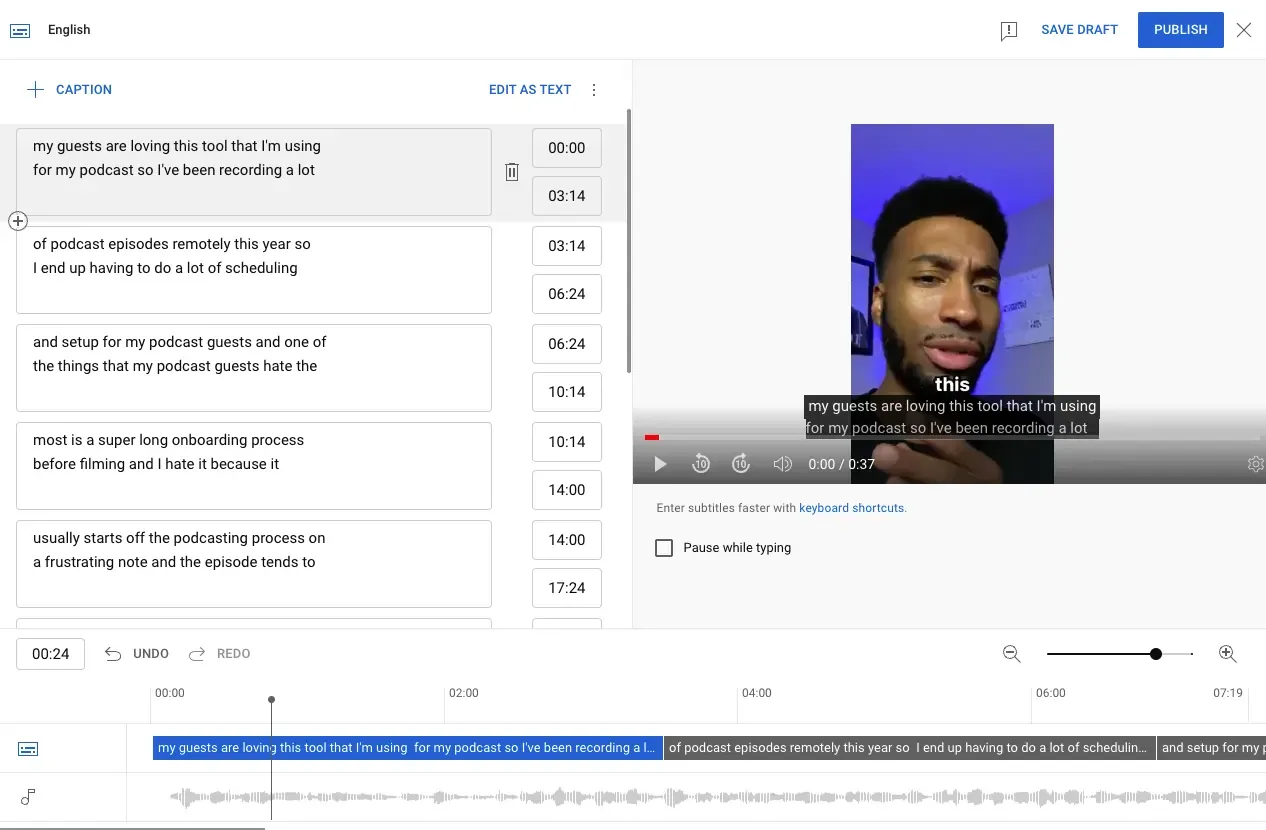
Step 6: Publish your content
Click “Publish” at the top of your screen to save all your changes.
Troubleshooting YouTube Shorts captions
Adding captions to your YouTube Shorts is simple enough—until you encounter a problem. Common issues like transcription errors or syncing problems can ruin the experience.
Riverside’s powerful captioning tools solve these problems faster and more reliably than YouTube’s native options. Here’s how:
Inaccurate transcriptions
YouTube’s automatic captions often fail due to multiple speakers, background noise, accents, or tricky jargon.
Riverside’s AI-powered transcription tool delivers up to 99% accuracy and supports more than 100 languages. The platform lets you quickly review and edit the text for spot-on, context-aware captions. Plus, Riverside’s high-quality audio recordings cut through background noise and improve clarity, ensuring accurate transcriptions from the start.
Captions not showing up
Sometimes, viewers can’t see captions because of browser settings or YouTube glitches.
With Riverside, you can embed captions directly into your video during export. This ensures captions are always visible, no matter the platform or device. Use Riverside’s preview feature to double-check that everything is synced and showing correctly before hitting “export.”
Syncing issues
Nothing is more distracting than captions that are out of sync with the audio.
Riverside's video editor automatically syncs captions with your audio. If the timing still feels off, you can adjust timestamps manually in Riverside’s text-based editor.
Captions obstructing visuals
In YouTube Shorts’ tight 9:16 frame, captions overlapping key visuals can be a dealbreaker.
Riverside lets you customize caption placement, font size, and style. Preview everything in the Shorts-friendly aspect ratio to ensure your captions are positioned precisely where they should be.
Best practices to avoid captioning problems
- Plan for clarity: Start with a solid foundation by recording in a quiet environment to reduce background noise that can confuse transcription tools. Speak clearly and keep your sentences concise—this helps with accurate captions and ensures your audience quickly grasps your message.
- Review before publishing: Always preview your captions after uploading to catch any errors or formatting issues. This quick review ensures your captions are accurate, properly synced, and displayed as intended.
- Back up your captions: Save a copy of your captions file in SRT format as a safety net. If you ever need to re-upload, edit, or repurpose your content, having this backup will save you time and prevent unnecessary headaches.
FAQs on YouTube Shorts captions
Do you still need more information? Here are the answers to some frequently asked questions about YouTube Shorts captions.
What languages does YouTube captioning support?
YouTube supports captions and subtitles in various languages, enhancing accessibility for a global audience.
Supported Languages:
- Automatic Captions: YouTube's automatic captioning is available in multiple languages, including Arabic, Bengali, Dutch, English, French, German, Hebrew, Hindi, Indonesian, Italian, Japanese, Korean, Portuguese, Russian, Spanish, Turkish, Ukrainian, and Vietnamese.
- Manual Subtitles: Creators can upload subtitles in over 155 supported languages and dialects, ranging from Afar to Zulu.
This extensive language support enables creators to reach a diverse audience, ensuring content is accessible to viewers worldwide.
Can you edit captions on YouTube Shorts?
Yes. You can manually edit your subtitle text using YouTube’s built-in captioning tools. However, you must duplicate YouTube’s original transcript to make any required edits. For this reason, it’s usually best to try to finalize your captions ahead of time.
How do I remove captions from YouTube Shorts?
To remove captions from your YouTube Shorts video, sign in to YouTube Studio and access the caption tool from the left sidebar menu. In the subtitles column related to the video you want to edit, select “Options,” and proceed to delete your captions before saving your changes. Note that this is only possible for closed captions, as open captions are embedded in the video.

.webp)
.webp)












.webp)



